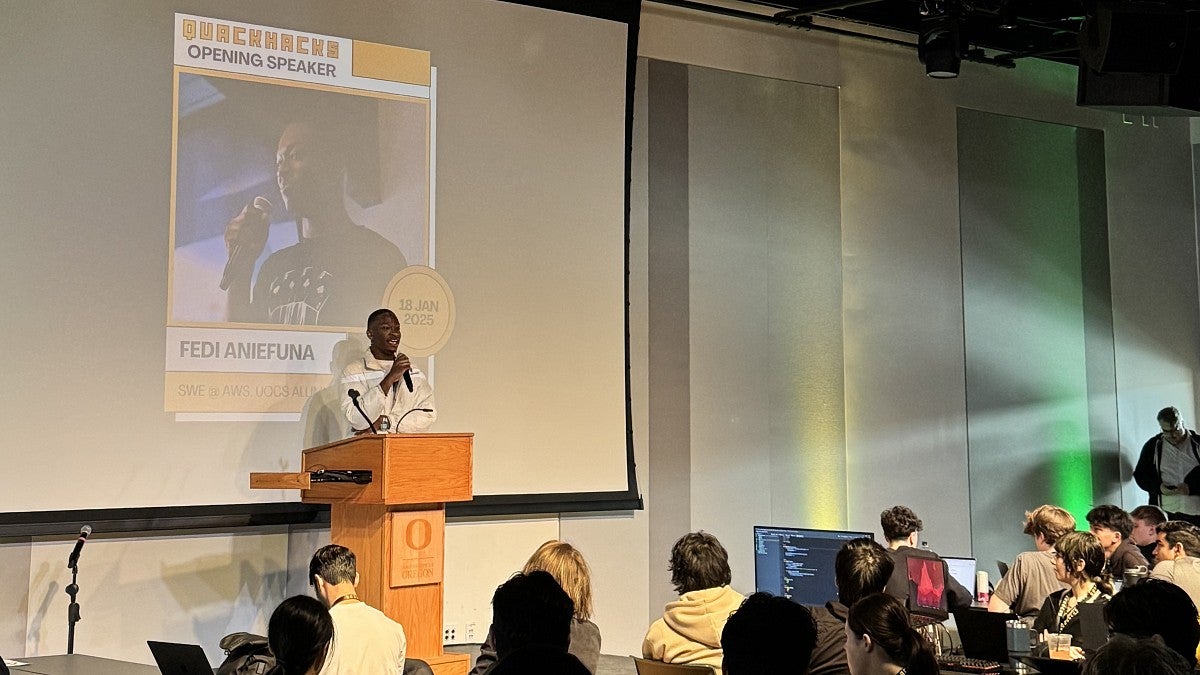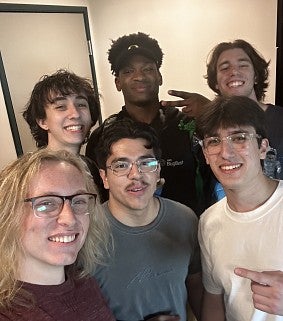
When Fedi Aniefuna arrived at the University of Oregon, he still hadn’t decided whether he wanted to major in political science and go to law school, or study computer science and head straight into the workforce.
Five years later, he’s beginning his second year as an engineer with Amazon Web Services after spending his time at the UO studying math and computer science. He also founded a new club to help other students prepare for careers in tech and taught data science programming through the DREAM lab at the UO.
“I feel like computer science opened up a space for me to be creative without having to stay within the normal structure of a standard curriculum,” said Aniefuna, who is from Portland. “I think that’s what enticed me to get into it. It took all the fun parts of math and all the creative freedom of stuff like literature and writing and combined it into one subject where you could actually develop something.”
Using a creative mindset to go beyond a standard curriculum was a theme of Aniefuna’s time at the UO.
Computer science majors following a traditional timeline generally aim to find an internship between their junior and senior year, but with the help of advisors from the Multicultural Center at the UO, Fedi landed a graduate level internship in Portland the summer after his sophomore year.
“I was working at the Black Cultural Center as an assistant, and every Tuesday, we'd have advisors coming in to give resources and extra tips. I'd always be talking with them, and they told me that there was a program called Emerging Leaders where they provided early career opportunities for students in areas including the tech sector,” Aniefuna explained.
Even though he was only a sophomore, he decided to try for the internship. He went into the interview, told them about himself and his experience at the UO, and they deemed him ready.
Having the opportunity to work in the industry accelerated Aniefuna’s progress in the classroom and inspired larger projects outside of it. He had been working with the UO DREAM lab teaching programming to all sorts of people at the UO and was finding opportunities to extend his support to more and more people in need, including some online.
“My first internship got me to start creating content on my LinkedIn profile, which I think really helped me get recognized by bigger companies during the next interview season,” he said.

Building on the experience he gained in his first internship, Aniefuna aimed to land an internship with some of the world’s biggest companies, including Amazon, for the summer after his junior year. As he prepared for the technical side of job interviews, a notoriously difficult part of navigating the tech industry, it occurred to him that he could create another opportunity for himself to teach, support his peers and sharpen his own knowledge of interviewing all at once. LEET Club was born.
The term "leet" is slang for elite skills or accomplishments in computer hacking. The club focuses on helping students develop the real-world understanding they need to land positions in the competitive tech industry. For more advanced computer science students, it also provides a chance to teach younger students some of the most critical concepts they’re working on.
“I started the club just as a way to help other students get familiar with the core material from interviews with companies,” said Aniefuna. “Acting as a tutor in that club helped me learn at a faster rate to get prepared for any other potential interviews.”
The work he did in the club paid off. Amazon offered him an internship for the summer after his junior year, then a full-time role once he graduated.
His current position involves managing firmware for the company, a job which requires him to juggle a variety of responsibilities all at once.
“It’s a pretty critical service that my team operates,” Aniefuna said. “And there’s a huge learning curve. You have to get familiar with the existing services, and then from there try to work with scaling it up and improving on it while still operating. That has its own challenges, but it also has been a major learning experience, and that personally has made me a way better developer in terms of troubleshooting and making scalable code.”
Aniefuna credited his growth to this point in part to the excellent work of his professors, particularly professor Eric Wills, who supported him in founding LEET Club, and professors Boyana Norris and Hank Childs, who saw his potential despite some challenging classes early in the computer science sequence.
Even though he’s busy with his job, Aniefuna has continued building on the teaching he started while he was at the UO. He recently started a new program where he hosts biweekly tutoring sessions to support job candidates from within Amazon and colleges across America with interview strategies to help them through the application process, a similar goal to that of LEET Club at the UO.
And although he no longer runs the club himself, Aniefuna’s support for UO students has continued; he was back on campus this past January as the keynote speaker for Quackhacks, the university’s flagship student-run hackathon, which was sponsored by the LEET Club. This 24-hour long coding marathon where students competed in groups to create the best project possible from start to finish couldn’t have happened without support from the club and its members.
Aniefuna has also continued producing content for LinkedIn and has plans to branch into YouTube as well. Whether it’s creating online content or teaching his peers critical skills, Aniefuna continues to think beyond the standard expectations of the job and direct his energy towards generously supporting those around him.
“I wouldn’t be where I am without the community and the people from the UO who helped me along the way,” he said.
—By Evan Ney, School of Computer and Data Science
